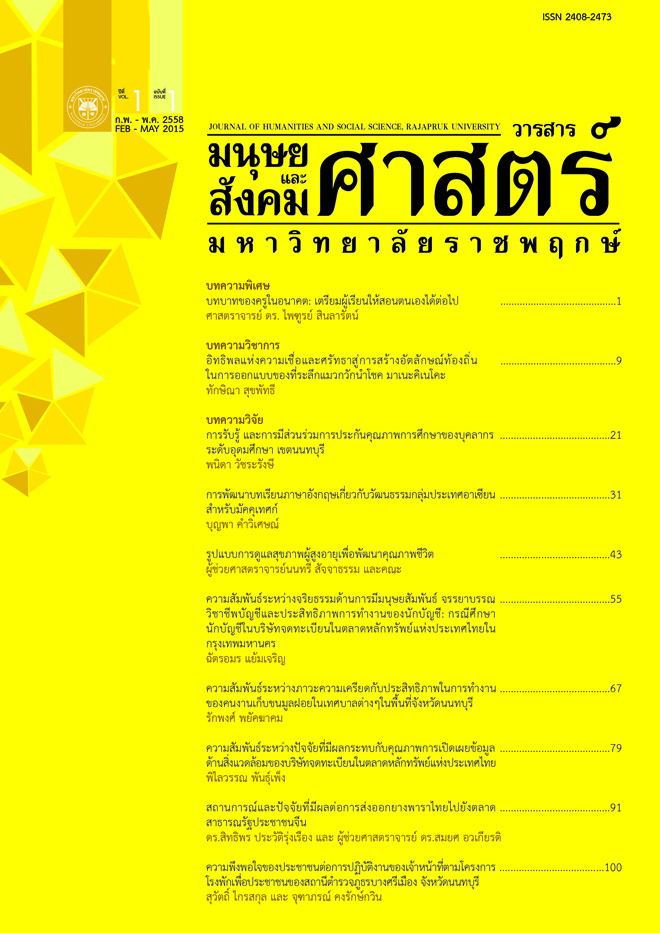Relationship between Work Stress and Work Efficiency of Waste Collectors in Municipal Areas of Nonthaburi Province
Main Article Content
Abstract
This research focused on the study of relationship between work stress and work
efficiency of waste collectors in various municipal areas of Nonthaburi province. It
also aimed to compare the difference between work stress and work efficiency
depending on personal factors of sample group which included sex, age, income and
welfare, family composition, job position, years of employment and numbers of shift.
The sample size of this study was 251 waste collectors. Questionnaires were used as
the equipment for data collection together with statistical methods (mean, standard
deviation, t-test, One-Way ANOVA and Pearson’s Product Moment Correlation
Coefficient) for data analysis.
The result of the study, it were found that 1) Samples whose different sex, family
composition, job position and numbers of shift had not statistical difference in work
stress but those whose different age, income & welfare, and years of employment had
statistical difference in work stress at the significant level of .01 2) Samples whose
different sex, job position and numbers of shift had not statistical difference in work but
those whose different age, income & welfare, family composition and years of
employment had statistical difference in work efficiency at the significant level of .01,
and 3) There was significant reverse relationship between work stress and work efficiency
of waste collectors (r = -0.574). It means that when work stress increase, work efficiency
will decrease. On the other hand, when work stress decrease, work efficiency will
increase.
Article Details
References
เสียและสารอันตราย. กระทรวงทรัพยากรธรรมชาติและสิ่งแวดล้อม.
กรมสุขภาพจิต. กระทรวงสาธารณสุข. (2541). คู่มือคลายเครียด. กรุงเทพฯ: สยามเอ็มแอนด์บีพับ
ลิซซิ่ง.
กองทรัพยากรธรรมชาติและสิ่งแวดล้อม. องค์การบริหารส่วนจังหวัดนนทบุรี. (2556). การจัดการ
มูลฝอยองค์การบริหารส่วนจังหวัดนนทบุรี. นนทบุรี: พระพุทธศาสนา.
ธงชัย สันติวงษ์. (2543). ทฤษฎีการจูงใจ (พิมพ์ครั้งที่ 9). กรุงเทพฯ : ไทยวัฒนาพานิช.
พสุ เดชะรินทร์. (2536). การบริหารความเครียด สาเหตุ ผลกระทบ และการควบคุม. จุฬาลงกรณ์
รีวิว. 5(20), 83-91
วิภาวรรณ เดือนฉาย. (2545) . ปัจจัยที่สัมพันธ์กับความเครียดของนักเรียนมัธยมศึกษาตอนปลาย
การบริหารทรัพยากรมนุษย์. ปริญญาครุศาสตรมหาบัณฑิต การศึกษา, คณะวิทยาการ
จัดการสถาบันราชภัฎสวนดุสิต.
สุรศักดิ์ สานุจารย์. (2536) . ความเครียดในการปฏิบัติหน้าที่ของเจ้าหน้าที่ตารวจจราจรของสถานี
ตำรวจนครบาลในกรุงเทพมหานคร. ปริญญาศึกษาศาสตรมหาบัณฑิต พัฒนาสังคม,
มหาวิทยาลัยเกษตรศาสตร์.
สมยศ นาวีการ. (2543). การบริหารและพฤติกรรมองค์การ. กรุงเทพฯ: บรรณกิจ.
อภิญญา วิเวโก. (2548). ปัจจัยด้านงาน ความเครียด และประสิทธิภาพการปฏิบัติงานของ
พนักงานในกรุงเทพมหานคร. ปริญญาบริหารธุรกิจมหาบัณฑิต วิชาการจัดการ,
มหาวิทยาลัยศรีนคริทรวิโรฒ.
Gilmer, V. Haller B. et al. (1966). Industrial Psychology. New York: McGraw-Hill.
Mondy, R. W. & Noe, R. W. (1996). Human Resqurce Management. New York:
Prentice Hall.
Motowidlo. S.J., J.S. Packard and M.R. Manning. (1986). Occopational Stress: Its
causes and Consequences for Job Performance. Journal of Applied
Psychology. 71, 618-629
Kneisl, C. R. (1996). Stress anxiety and coping. In H. S. Wilson & C. R. Kneisl (Eds.),
Psychiatric nursing (5th ed., pp. 62-80). California: Addison-Wesley.
Selye. Hans. (1976). The Stress of Life. New York: McGraw-Hill Book.


